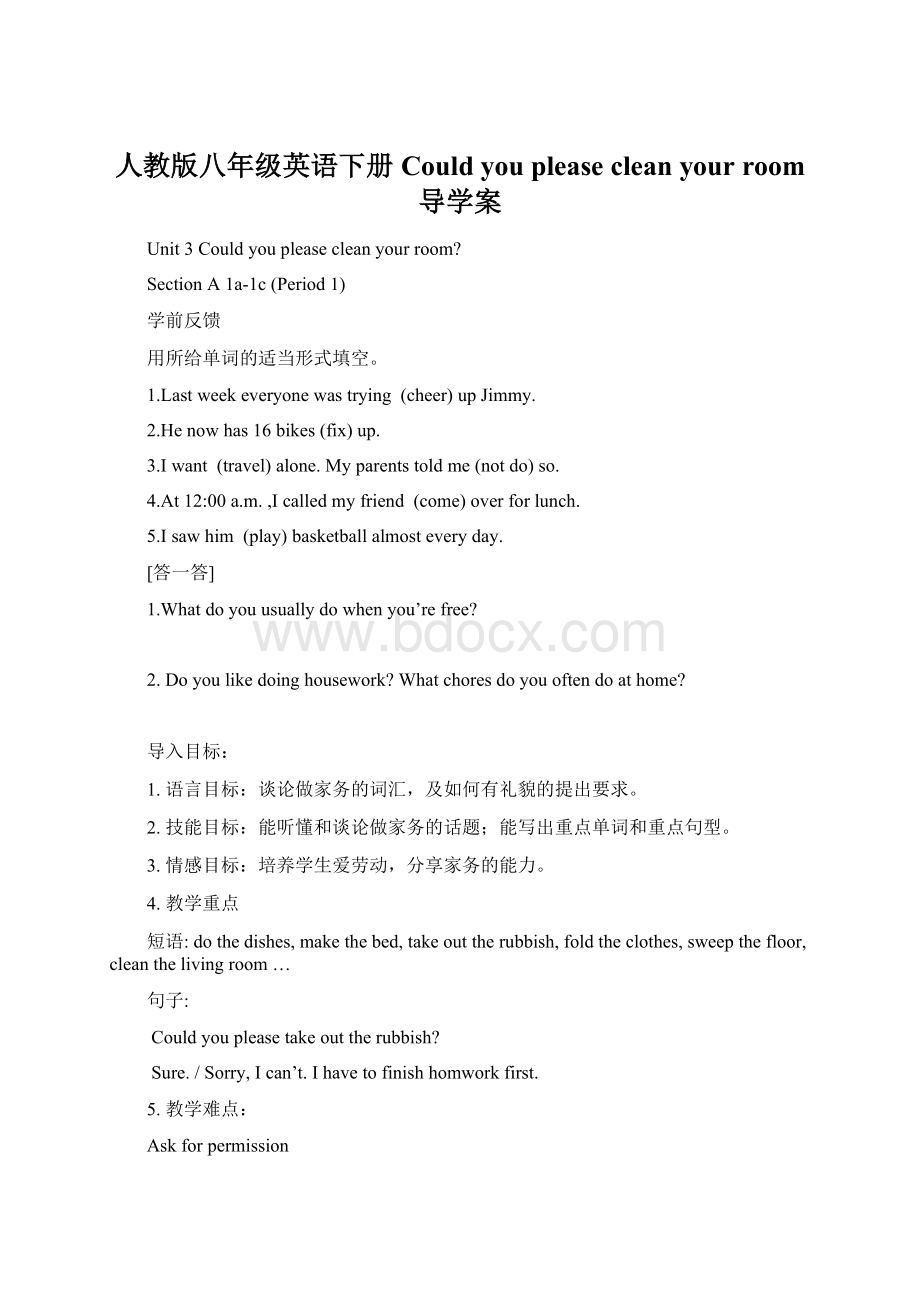人教版八年级英语下册Could you please clean your room 导学案Word文档格式.docx
《人教版八年级英语下册Could you please clean your room 导学案Word文档格式.docx》由会员分享,可在线阅读,更多相关《人教版八年级英语下册Could you please clean your room 导学案Word文档格式.docx(16页珍藏版)》请在冰豆网上搜索。

1.垃圾;
废弃物2.折叠;
对折
3.扫;
打扫4.地板
5.杂乱;
不整洁
[译一译]
1.倒垃圾2.拖地板
3.整理床铺4.洗餐具
5.叠衣服6.打扫客厅
7.你能帮忙做写事情吗?
Couldyoupleasewithafewthings?
合作探究
1.Watchthephotosandtakaboutthem“Whatdoeshedoeveryday?
’andlearnthesephrases:
dochores,dothedishes,makethebed,takeouttherubbish,fodtheclotes,dothelaundry,cleanthelivingroom.
2.Lookthesephrasesandpracticetheconversation:
Sure./Sorry,Ican’t.Ihavetofinishhoeworkfirst.
3.1aDoyoudothesechoresathome?
Discussthemwithyourpartner.
4.1bListen.Whowilldothesechores?
Check(√)Peter’smotherorPeter.
展示交流
Makeconversationsaboutthechoresin1a.
Examples
A:
Couldyouplease...?
B:
Yes,sure./Allright./Noproblem./Certainly.
Sorry,Ican'
t.Ihavetodo..
Sorry,Ican'
t.Iamdoing...
达标提升
根据汉语提示完成英语句子。
1.Sheis(叠衣服)now.
2.Idon’thate(倒垃圾).It’sfun.
3.MissKangoften(打扫起居室)atweekends.
4.Mr.Wanglikestohelpshiswife(洗衣服).
5.Lucy’smotherasksher(整理床铺)byherselfaftershegetsupinthemorning.
SectionA2a-2d(Period2)
1.听写上节课所学的短语。
dothedishes,sweepthefloor,takeoutthetrash,makethebed,foldtheclothes,cleantheroom
2.展开对话—Couldyouplease…?
—Yes,please./Sorry,Ican’t.
导入目标
1.语言目标:
2.技能目标:
3.情感目标:
4.重点句型:
—CouldIuseyourcomputer?
—Sorry.I'
mgoingtoworkonitnow.
—CouldIwatchTV?
—Yes,youcan.Butfirstyouhavetocleanyourroom.
Role-playtheconversation.
自主学习
1.作出听力预测。
2.找出有礼貌地提出要求的句子;
圈出并努力弄懂重点难点句子。
合作探究
Languagepoints:
1.helpout动词短语,表示在某人繁忙或遇到困难时“给予帮助”。
help和out之间还可以加入具体的“人”。
e.g.Hehelpedmeoutwithmytask.
他帮我完成了任务。
Theyhelped(us)outwiththeclean-up.
他们帮助我们做大扫除。
2.atleast至少
e.g.Weshouldbrushourteethatleasttwiceaday.
我们每天应该至少刷两次牙。
3.beback回来
e.g.Iwon'
tbebacktill11:
00.
我11点以前回不来。
4.anyminutenow
一种常见的口语表达法,相当于“随时;
马上;
在任何时刻”的意思,表示事情有可能在极短的时间内发生或眼下就要发生。
minute还可以用second,moment,time等词替换。
e.g.Don'
tworry,hewillcomehereanyminutenow.
别担心,他会马上来这儿。
Theguestsarearrivinganytimenowbutwe’restillnotready.
客人即刻就到,但我们还没有准备好。
We’reexpectingthemanymomentnow.
我们期待他们随时到来。
2cMakeconversationsusingtheinformationin2aand2b
A:
CouldIuseyourcomputer?
B:
Sorry.I’mgoingtoworkonitnow.
Well,couldIwatchTV?
Yes,youcan.Butfirstyouhavetocleanyourroom?
2dRole–playtheconversation。
1Listallthemainphrasesofdoingchoresthatyouknow.(必做)
2Makeaconversationbetweenyouandyourmother,usingthesentencepattern“Couldyouplease…?
”(选做)
SectionA3a-3c(Period3)
Checkthehomework.Listallthemainphrasesofdoingchoresthatyouknow.
takeouttherubbishdochoresdothedishessweepthefloor
makedinnerfoldtheclothescleanthelivingroom
helpoutwithatleastfinishdoingsth.
bebackfromshoppingseethismessmoreclean
导入目标
1.Newvocabulary
lastmonth,comeover,takethedogforawalk,watchoneshowallthetime,thenextday,neitherdidI
2.TheminuteIsatdowninfrontoftheTV,mymomcameover.
Foroneweek,shedidnotdoanyhousework,andneitherdidI.
I’mjustastiredasyouare!
能力目标:
学会运用所学句式谈论做家务活的经过和感受。
情感目标:
正确处理做家务和学习之间的关系;
能体谅父母。
Languagepoints
1.YouwatchTVallthetimeand...
allthetime(在该段时间内)一直;
向来,一向;
时时刻刻;
每时每刻
e.g.Idothisallthetime.我一直是这么做的。
Thishappensallthetime.这种情况是时时发生的。
2.I’mjustastiredasyouare!
as...as意为“和……一样”,表示同级的比较。
使用时要注意第一个as为副
词,第二个as为连词。
其基本结构为:
as+
adj./
adv.
+as。
e.g.This
film
is
as
interesting
that
one.这部电影和那部电影一样有趣。
Your
pen
writes
smoothly
mine.你的钢笔书写起来和我的一样流畅。
as…as的否定形式为“notas/so+adj./adv.+as”。
e.g.Hedidn’tactaswellasyou.他表现得不如你好。
3.Foroneweek,shedidnotdoanyhousework,andneitherdidI.
neither用作副词,作“也不”解释,放在句首,表示前面否定的内容也适用于
另一个人或物,句子须采用部分倒装。
此时也可用nor替换neither使用。
例如:
—I
don’t
like
this
dress.
我不喜欢这件连衣裙。
—Neither
/
Nor
do
I.
我也不喜欢。
注意:
neither之后的主语要置于助动词或系动词之后。
neither用作代词,表示“两者都不,双方均不”。
例如:
He
answered
neither
of
the
letters.
他两封信都没回。
—Which
one
would
you
like?
你喜欢哪一个?
—Neither.两个都不喜欢。
also,too,either,neither的用法
一、also是比较正式的用语,语气较庄重。
它通常放在句中,位于行为动词之
前,连系动词之后;
如有助动词或情态动词,一般放在助动词或情态动词
之后。
例如:
Peteralsohastwobrothers.彼得也有两个兄弟。
Iamalsoastudent.我也是一名学生。
Mrs.GreencanalsosingthesonginChinese.格林夫人也能用汉语唱这首歌。
二、too是普通用词,多用于口语,语气较随便。
一般用在肯定句中,放在句
末。
I’minRow1,too.我也在第一排。
also和too一般都用于肯定句,很少用于否定句。
三、either表示“也”时,一般只用于否定句,且置于句末。
Idon’tknowhim.Tomdoesn’tknowhim,either.
我不认识他,汤姆也不认识他。
Ifyoudon’tgothere,hewon’tgothere,either.
如果你不去那儿,他也不会去那儿。
either本身没有否定的意义。
所以多与not连用。
四、neither表示“两个都不”,它作主语时,谓语动词常用单数。
Neitherofyoucandoit.你们两个都不能做这件事。
3aReadthepassageandanswerthefollowingquestions.
1.DidNancydoanyhouseworkthatday?
2.WhywasNancy’smomangrywithNancy?
3.Didtheysolvetheproblem?
How?
3bReadthestoryagainandreadthesentencesbelow.Underlinethesentencesfromthereadingthatmeanthesamething.
1.Neitherofusdidanyhouseworkforaweek.
2.MymomcameoverassoonasIsatdowninfrontoftheTV.
3.You’retired,butI’mtired,too.
3cDecidewhethertheunderlinedwordsinthesentencesareverbsornouns.Thenwriteanothersentenceusingtheunderlinedwordintheotherform.
1.Couldyoutakethedogforawalk?
(noun)
2.CouldIwatchoneshowfirst?
3.Ican’tworkallday.
4.YouwatchTVallthetime.
5.“Whathappened?
”sheaskedinsurprise.
1.听材料并跟读材料,模仿语音、语调、停顿。
2.学生朗读课文。
单词词性方面的知识:
一词多性。
给出更多的例子。
SectionAGrammarfocus-4c(Period4)
根据所学内容,写出下列短语。
foldone’sclothes,dothedishes,useone’scomputer,takeouttherubbish,makethebed,sweepthefloor,stayoutlate,beangrywithsb.,takesb.forawalk,cleanthelivingroom,workon,comeover,dothehousework,getaride
学习运用情态动词的用法,并运用could有礼貌地提出请求及回答。
Couldyou(please)+V-原形?
表示委婉地提出请求
1.Couldyoupleasecleanyourroom?
Yes,sure./Ofcourse./Certainly./Allright.
2.Couldyoupleasedothedishes?
Sorry,Ican’t.Ihavetodomyhomework.
在表示请求帮助或请求允许的疑问句中,常用could代替can,以表示礼貌,委婉或不确定的语气,而can则不具备这些语气。
这种情况下不能把could看作can的过去式。
以上两句中用could是为了表示礼貌的请求。
表示请求帮助或请求允许时,除了can,could之外,还可以用may,句子的表达方式也各有不同,可以用不同的方式来表示同一个概念。
例:
①Could/Can/MayIuseyourcarforaday?
②IwonderifIcoulduseyourcarforaday?
对于①、②句所作允答可以各种各样,如同意可以说Yes或Sure或Certainly,还可说Yes,(do)please.或Ofcourse.(youmay/can).或Goahead,please.或That’sOK/allright;
如果不同意,可以说I’msorryyoucan’t.或I’mreallysorry,butIhavetouseittoday.要避免说No,youcan’t.这样显得很不礼貌。
否定回答通常用委婉语气。
③DoyoumindifIuseyourcarforaday?
对于句③所作回答可以说Nevermind./Notatall.表“不介意”。
不能用Yes./Sure./Ofcourse./Certainly.等。
无论肯定还是否定应答中,要避免使用could,要用can或may。
因为应答须用确定的语气。
而could在表请求的问句中是为了表示礼貌或委婉语气,用在应答中则成了不确定语气,与情理不符。
所以应答中不说Yes,youcould.或No,youcouldn’t.而要说Yes,youcan.或Sorry./No,youcan’t.
—CouldIpleaseuseyourcomputer?
—Sorry,I’mgoingtoworkonitnow.
—Well,couldIwatchTV?
—Yes,youcan.
CouldI/youplease…?
表示一种有礼貌的请求或提议,其后连接原形动词,比Canyou/I…?
语气更委婉。
类似句型有:
Wouldyoulike+sth./todosth.?
MayI+dosth.?
Shallwe+dosth.?
Wouldyoumind+sth./doingsth.?
What/Howabout+sth./doingsth.?
肯定回答有Sure./Ofcourse./Certainly./OK./Great./Well./Goodidea./Iagree.等。
否定回答有Sorry…/No,youcan’t.等。
1.MakeupdialoguesusingthesentencesinGrammarFocuswithyourpartner.
Couldyoupleasetakethedogforawalk?
OK,butIwanttowatchoneshowfirst.
2.4aWriteRforrequestsandPforpermission.Thenmatcheachonewiththecorrectresponse.
3.4bFillintheblanksintheconversation.
Ihateto____chores.
Well,Ihatesomechorestoo,butIlikeotherchores.
Really?
Great!
_____Iaskyouto____mewithsomechoresthen?
Whatdoyouneedhelpwith?
______youplease_____myclothesforme?
Idon’twanttodothat!
It’sboring!
OK.Then______you______dothedishesforme?
Sure,noproblem.But_____wegotothemoviesafterthat?
Sure.I’llfinishmyhomeworkwhileyouhelpmewiththedishes.Thenwecangotothemovies.
Discussion
Ifwearehavingacampingtrip,whatshouldwedobeforethetrip?
Writealettertoyourfriendtoaskhim/hertotakecareofyourhousewhenyouareonvacation.
SectionB1a-1e(Period5)
单项选择。
1.--Couldyoupleasetakecareofmydog?
--______.I’mtoobusy.
A.Yes,youcan
B.Sure
C.Sorry,Ican’t
2.--Couldyouplease____hisbed?
--Certainly!
A.makesB.makingC.make
3.--CouldIuseyourcar?
--______.
A.Sure,youcan
B.Sorry,youcan
C.Sure,Ican
4.Couldyouhelp